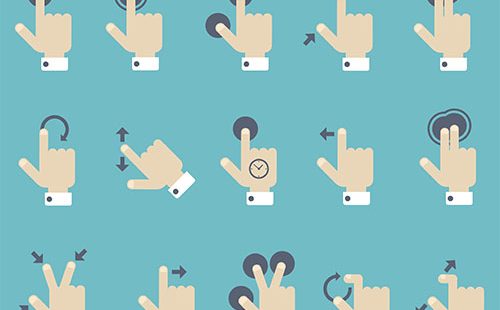Even the least tech-savvy lexicographer understands that technology is a robust source of new words. As technologies move from the realm of science fiction into our everyday realities, new words and meanings spring up around them. While it is expected that names for these new technologies and the words describing our interaction with them are regularly entering the language, there are less obvious coinages that grow out of technological advancement. Old technologies get rebranded to disambiguate them from newer ones, and more abstract terms enter the lexicon to characterize how our world has been shaped by innovation.
A change in interface can often lead to a change in vocabulary. Over the last several years, as touchscreen technology has been widely adopted, Dictionary.com has added many new definitions to capture the lexicon of this user interaction. Pinch, scroll, zoom, swipe, and tap have taken on new senses in this context. The introduction and adoption of devices such as smartwatches, fitness trackers, and smart glasses launched the term wearables (which has been used as a plural noun since the early 1700s to refer to something that can be worn) into widespread use. Designers now discuss glanceable interfaces, that is, interfaces that allow users to attain meaningful information from one glance at a wearable device.
Another lexical phenomenon: as new technologies emerge, old systems get rechristened to distinguish them from new ones. New coinages for preexisting items or systems are called retronyms. When telephones first became portable, the type of phone that is physically plugged into a wall socket became a landline. Old versions of mobile phones have picked up various names over the years to separate them from the most modern incarnations. When people talk about Zach Morris phones, they are referring to a very specific period in the history of phone technology. A flip phone is distinct from a smartphone, and sometimes people even refer to non-smartphones as dumbphones. Following this trend, non-smartwatches are already being called dumbwatches in snarky headlines.
In a time when our lives are so heavily dependent upon technology, terms have popped up to describe situations which specifically lack technology. The popular slang abbreviation IRL, short for “in real life,” refers to a face-to-face situation as opposed to a virtual one. The buzzwords digital detox, unplug, device-free, and screen-free have gained popularity thanks to the increasing appeal of taking breaks from technology. “Leaving the internet” has become a newsworthy story, as in the case of Paul Miller’s yearlong hiatus and Baratunde Thurston’s 25-day leave of absence. You don’t have to be a full-out Luddite to be considered a disconnectionist, or “a person who advocates spending time away from online activities, particularly for mental or spiritual rejuvenation,” according to Word Spy editor Paul McFedries. The show Portlandia pokes fun at the perils of technological overstimulation in their sketch about falling into a technology loop. The sketch is tongue in cheek, but internet addiction disorder, also sometimes called problematic internet use, compulsive internet use, and iDisorder, might actually be a legitimate ailment. A case study in the February 2015 volume of Addictive Behaviors suggests that one man has undergone withdrawal from Google Glass after using it regularly for up to 18 hours a day.
While technology is just one of many topics that regularly generates new terminology, it’s an important one. These words and meanings are often so intertwined with modern life that they achieve widespread usage relatively quickly. Those in the tech industry: name your products and interfaces thoughtfully. Your innovations could change the lexicon.














